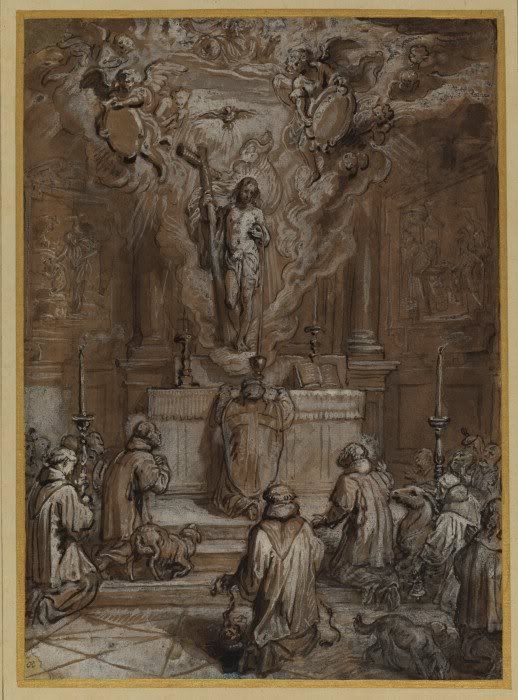
I have no delight in corruptible food, nor in the
pleasures of this life. I desire the bread of God, the heavenly bread, the bread
of life, which is the flesh of Jesus Christ, the Son of God, who became
afterwards of the seed of David and Abraham; and I desire the drink of God,
namely His blood, which is incorruptible love and eternal life.
St. Ignatius of
Antioch Letter to the Romans 7
They
abstain from the Eucharist and from prayer, because they confess not the
Eucharist to be the flesh of our Saviour Jesus Christ, which suffered for our
sins, and which the Father, of His goodness, raised up again.
St. Ignatius of
Antioch Letter to the Smyrnaeans, 7,1
And
this food is called among us Eukaristia [the Eucharist], of which no one is
allowed to partake but the man who believes that the things which we teach are
true, and who has been washed with the washing that is for the remission of
sins, and unto regeneration, and who is so living as Christ has enjoined. For
not as common bread and common drink do we receive these; but in like manner as
Jesus Christ our Saviour, having been made flesh by the Word of God, had both
flesh and blood for our salvation, so likewise have we been taught that the food
which is blessed by the prayer of His word, and from which our blood and flesh
by transmutation are nourished, is the flesh and blood of that Jesus who was
made flesh.
St. Justin Martyr First Apology 66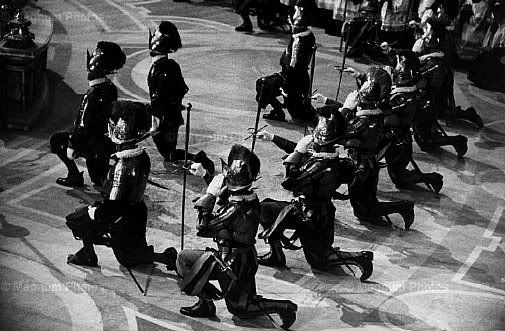
So
then, if the mixed cup and the manufactured bread receive the Word of God and
become the Eucharist, that is to say, the Blood and Body of Christ, which
fortify and build up the substance of our flesh, how can these people claim that
the flesh is incapable of receiving God’s gift of eternal life, when it is
nourished by Christ’s Blood and Body and is His member? It is this which is
nourished by the cup which is His Blood, and is fortified by the bread which is
His Body.
St. Irenaeus Five Books on the Unmasking and Refutation
Then,
again, how can they say that the flesh, which is nourished with the body of the
Lord and with His blood, goes to corruption, and does not partake of life? Let
them, therefore, either alter their opinion, or cease from offering the things
just mentioned. But our opinion is in accordance with the Eucharist, and the
Eucharist in turn establishes our opinion. For we offer to Him His own,
announcing consistently the fellowship and union of the flesh and Spirit. For as
the bread, which is produced from the earth, when it receives the invocation of
God, is no longer common bread, but the Eucharist, consisting of two realities,
earthly and heavenly; so also our bodies, when they receive the Eucharist, are
no longer corruptible, having the hope of the resurrection to eternity.
St. Irenaeus
Against Heresies
Therefore,
He is a rich treasure, for His bread is rich. And ‘rich’ is apt for one who has
eaten this bread will be unable to feel hunger. He gave it to the Apostles to
distribute to a believing people, and today He gives it to us, for He, as a
priest, daily consecrates it with His own words. Therefore, this bread has
become the food of the saints.
St.
Ambrose of Milan The Patriarchs
The
Word is all to the child, both father and mother and tutor and nurse. “Eat ye my
flesh,” He says, “and drink my blood.” Such is the suitable food which the Lord
ministers, and He offers His flesh and pours forth His blood, and nothing is
wanting for the children’s growth. O amazing mystery.
St. Clement of
Alexandria The Instructor 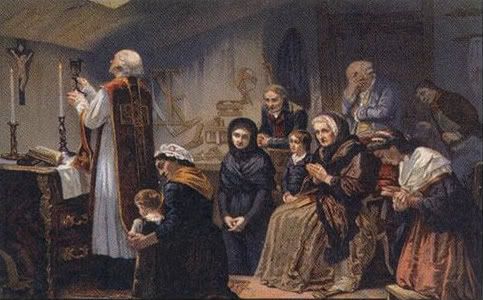
I
wish to admonish you with examples from your religion. You are accustomed to
take part in the divine mysteries, so you know how, when you have received the
Body of the Lord, you reverently exercise every care lest a particle of it fall,
and lest anything of the consecrated gift perish. You account yourselves guilty,
and rightly do you so believe, if any of it be lost through negligence. But if
you observe such caution in keeping His Body, and properly so, how is it that
you think neglecting the word of God a lesser crime than neglecting His Body?
Origen Homilies on
Exodus 13,3
Since
then He says that, if anyone eats of His bread, he lives forever, as it is
manifest that they live who attain to His body and receive the Eucharist by
right of communion, so on the other hand we must fear and pray lest anyone,
while he is cut off and separated from the body of Christ, remain apart from
salvation, as He Himself threatens, saying: ‘Unless you eat the flesh of the Son
of man and drink His blood, you shall not have life in you.’ And so we petition
that our bread, that is Christ, be given us daily, so that we, who abide and
live in Christ, may not withdraw from His sanctification and body.
St.
Cyprian of Carthage The Lord’s Prayer 18
So
too the the sacred meaning of the Pasch lies essentially in the fact, laid down
in Exodus, that the lamb – slain as a type of Christ – should be eaten in one
single home. God says the words: ‘In one house shall it be eaten, ye shall not
cast its flesh outside.’ The flesh of Christ and the Lord’s sacred body cannot
be cast outside, nor have believers any other home but the one Church.
St.
Cyprian of Carthage The Unity of the Catholic Church 8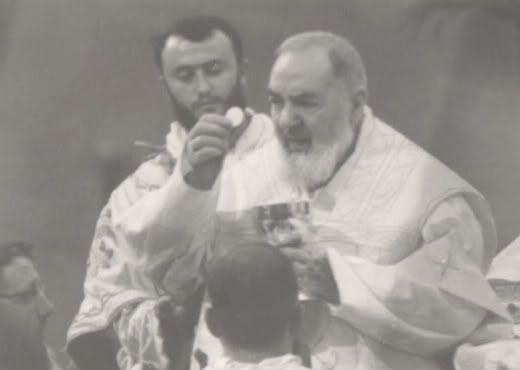
That
our Lord Jesus Christ in the night in which He was betrayed, took bread, and
when He had given thanks He brake it, and gave to His disciples, saying, Take,
eat, this is My Body: and having taken the cup and given thanks, lie said, Take,
drink, this is My Bloods. Since then He Himself declared and said of the Bread,
This is My Body, who shall dare to doubt any longer? And since He has Himself
affirmed and said, This is My Blood, who shall ever hesitate, saying, that it is
not His blood?
St. Cyril of Jerusalem Catechetical Lectures 22,1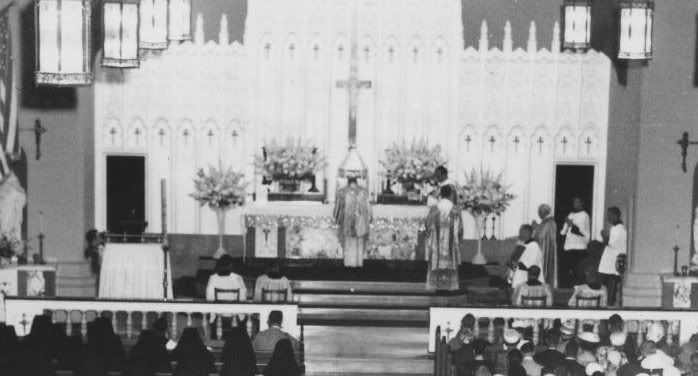
When the word says, ‘This is My Body,’ be convinced of
it and believe it, and look at it with the eyes of the mind. For Christ did not
give us something tangible, but even in His tangible things all is intellectual.
So too with Baptism: the gift is bestowed through what is a tangible thing,
water; but what is accomplished is intellectually perceived: the birth and the
renewal. If you were incorporeal He would have given you those incorporeal gifts
naked; but since the soul is intertwined with the body, He hands over to you in
tangible things that which is perceived intellectually. How many now say, ‘I
wish I could see His shape, His appearance, His garments, His sandals.’ Only
look! You see Him! You touch Him! You eat Him!
St.
John Chrysostom Homilies on the Gospel of Matthew 82,4
What
is the mark of a Christian? That he be purified of all defilement of the flesh
and of the spirit in the Blood of Christ, perfecting sanctification in the fear
of God and the love of Christ, and that he have no blemish nor spot nor any such
thing; that he be holy and blameless and so eat the Body of Christ and drink His
Blood; for ‘he that eateth and drinketh unworthily, eateth and drinketh
judgement to himself.’ What is the mark of those who eat the Bread and drink the
Cup of Christ? That they keep in perpetual remembrance Him who died for us and
rose again.
St. Basil the Great The Morals 22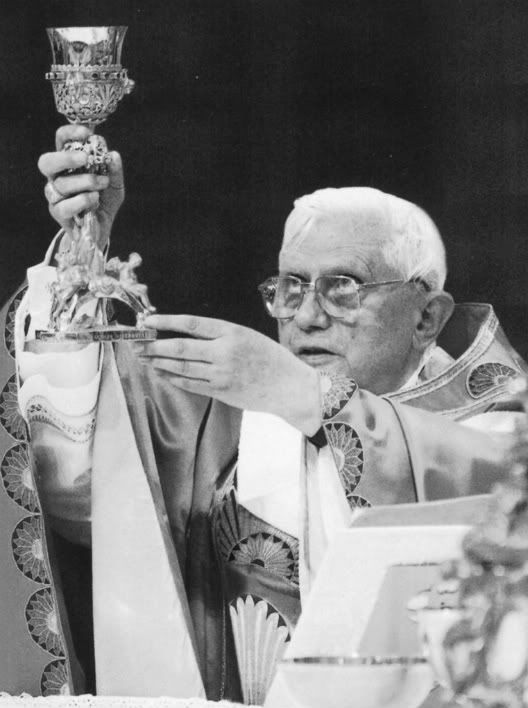
After the great and wonderful prayers have been
completed, then the bread is become the Body, and the wine the Blood, of our
Lord Jesus Christ.
St. Athanasius Sermon to the Newly Baptized
The
bread is at first common bread; but when the mystery sanctifies it, it is called
and actually becomes the Body of Christ.
St.
Gregory of Nyssa Orations and Sermons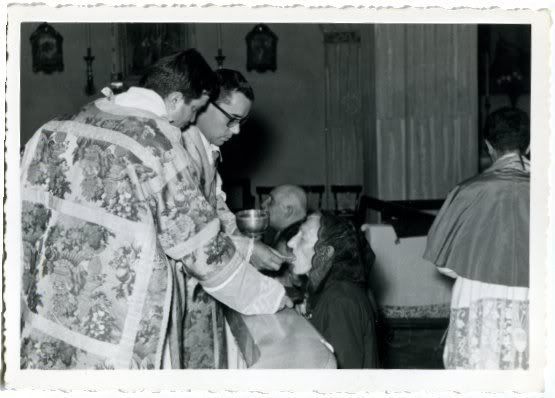
After
the type had been fulfilled by the Passover celebration and He had eaten the
flesh of the lamb with His Apostles, He takes bread which strengthens the heart
of man, and goes on to the true Sacrament of the Passover, so that just as
Melchisedech, the priest of the Most High God, in prefiguring Him, made bread
and wine an offering, He too makes Himself manifest in the reality of His own
Body and Blood.
St. Jerome Commentaries on the Gospel of Matthew
4,26,26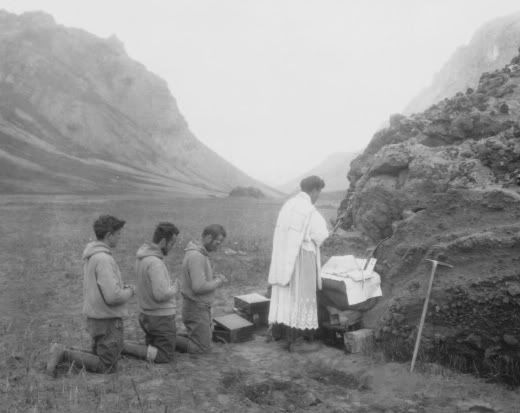
For
the whole Church observes this practice which was handed down by the Fathers:
that it prayers for those who have died in the communion of the Body and Blood
of Christ, when they are commemorated in their own place in the sacrifice
itself; and the sacrifice is offered also in memory of them on their behalf.
St.
Augustine Sermons 172,2
He
states demonstratively: “This is My Body,” and “This is My Blood,” lest you
might suppose the things that are seen are a figure. Rather, by some secret of
the all-powerful God the things seen are transformed into the Body and Blood of
Christ, truly offered in a sacrifice in which we, as participants, receive the
life-giving and sanctifying power of Christ.
St.
Cyril of Alexandria Commentary on Matthew (26:27)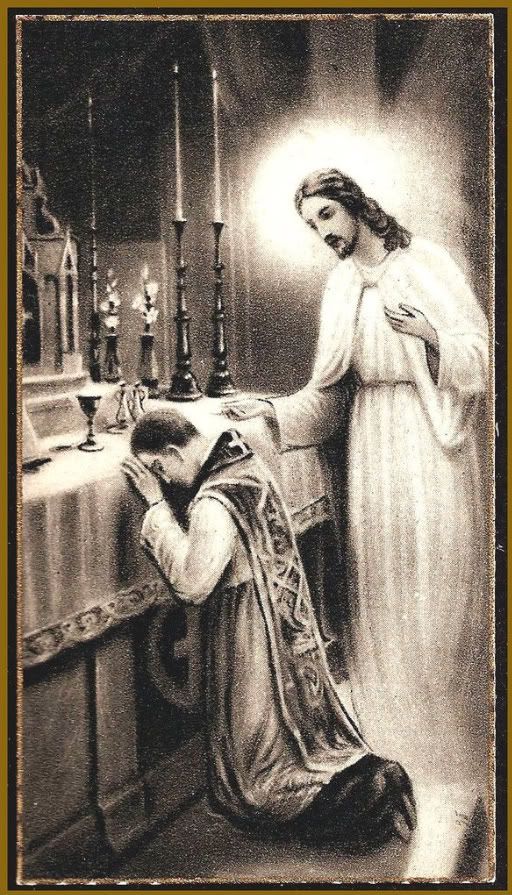
fonte:http://hallowedground.wordpress.com/2008/04/24/real-presence-what-say-the-fathers/

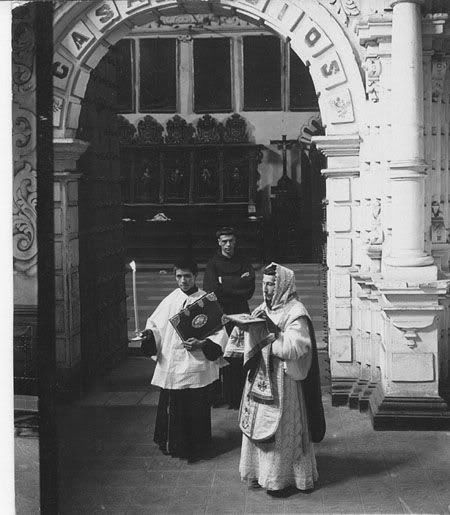
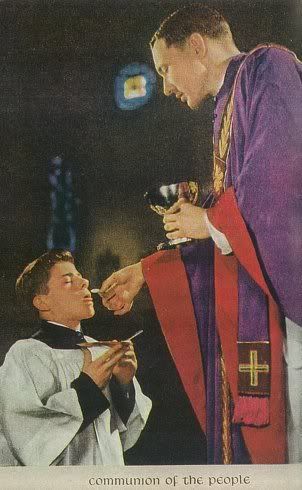
 So
then, if the mixed cup and the manufactured bread receive the Word of God and
become the Eucharist, that is to say, the Blood and Body of Christ, which
fortify and build up the substance of our flesh, how can these people claim that
the flesh is incapable of receiving God’s gift of eternal life, when it is
nourished by Christ’s Blood and Body and is His member? It is this which is
nourished by the cup which is His Blood, and is fortified by the bread which is
His Body. St. Irenaeus Five Books on the Unmasking and Refutation
So
then, if the mixed cup and the manufactured bread receive the Word of God and
become the Eucharist, that is to say, the Blood and Body of Christ, which
fortify and build up the substance of our flesh, how can these people claim that
the flesh is incapable of receiving God’s gift of eternal life, when it is
nourished by Christ’s Blood and Body and is His member? It is this which is
nourished by the cup which is His Blood, and is fortified by the bread which is
His Body. St. Irenaeus Five Books on the Unmasking and Refutation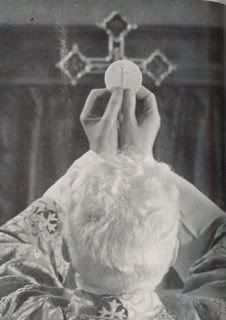
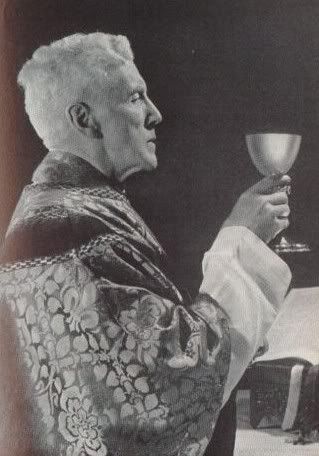
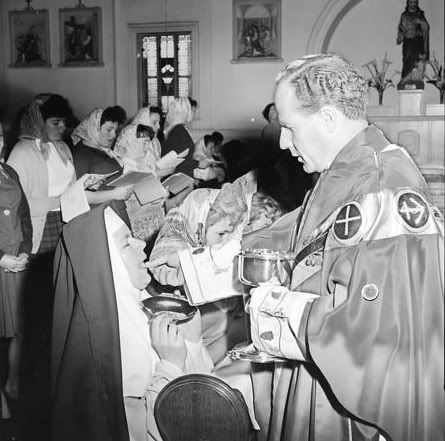
 I
wish to admonish you with examples from your religion. You are accustomed to
take part in the divine mysteries, so you know how, when you have received the
Body of the Lord, you reverently exercise every care lest a particle of it fall,
and lest anything of the consecrated gift perish. You account yourselves guilty,
and rightly do you so believe, if any of it be lost through negligence. But if
you observe such caution in keeping His Body, and properly so, how is it that
you think neglecting the word of God a lesser crime than neglecting His Body?
Origen Homilies on
Exodus 13,3
I
wish to admonish you with examples from your religion. You are accustomed to
take part in the divine mysteries, so you know how, when you have received the
Body of the Lord, you reverently exercise every care lest a particle of it fall,
and lest anything of the consecrated gift perish. You account yourselves guilty,
and rightly do you so believe, if any of it be lost through negligence. But if
you observe such caution in keeping His Body, and properly so, how is it that
you think neglecting the word of God a lesser crime than neglecting His Body?
Origen Homilies on
Exodus 13,3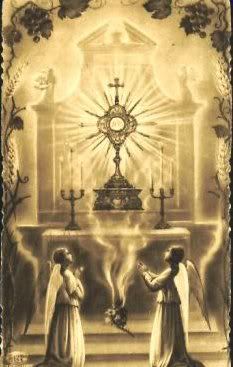
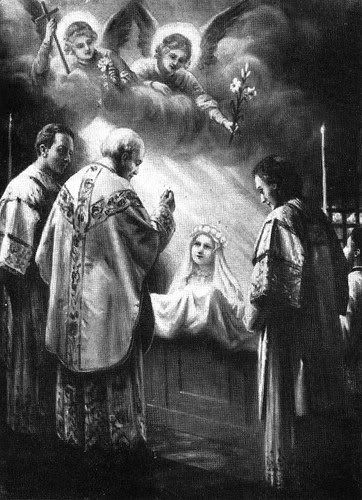
 That
our Lord Jesus Christ in the night in which He was betrayed, took bread, and
when He had given thanks He brake it, and gave to His disciples, saying, Take,
eat, this is My Body: and having taken the cup and given thanks, lie said, Take,
drink, this is My Bloods. Since then He Himself declared and said of the Bread,
This is My Body, who shall dare to doubt any longer? And since He has Himself
affirmed and said, This is My Blood, who shall ever hesitate, saying, that it is
not His blood? St. Cyril of Jerusalem Catechetical Lectures 22,1
That
our Lord Jesus Christ in the night in which He was betrayed, took bread, and
when He had given thanks He brake it, and gave to His disciples, saying, Take,
eat, this is My Body: and having taken the cup and given thanks, lie said, Take,
drink, this is My Bloods. Since then He Himself declared and said of the Bread,
This is My Body, who shall dare to doubt any longer? And since He has Himself
affirmed and said, This is My Blood, who shall ever hesitate, saying, that it is
not His blood? St. Cyril of Jerusalem Catechetical Lectures 22,1 When the word says, ‘This is My Body,’ be convinced of
it and believe it, and look at it with the eyes of the mind. For Christ did not
give us something tangible, but even in His tangible things all is intellectual.
So too with Baptism: the gift is bestowed through what is a tangible thing,
water; but what is accomplished is intellectually perceived: the birth and the
renewal. If you were incorporeal He would have given you those incorporeal gifts
naked; but since the soul is intertwined with the body, He hands over to you in
tangible things that which is perceived intellectually. How many now say, ‘I
wish I could see His shape, His appearance, His garments, His sandals.’ Only
look! You see Him! You touch Him! You eat Him! St.
John Chrysostom Homilies on the Gospel of Matthew 82,4
When the word says, ‘This is My Body,’ be convinced of
it and believe it, and look at it with the eyes of the mind. For Christ did not
give us something tangible, but even in His tangible things all is intellectual.
So too with Baptism: the gift is bestowed through what is a tangible thing,
water; but what is accomplished is intellectually perceived: the birth and the
renewal. If you were incorporeal He would have given you those incorporeal gifts
naked; but since the soul is intertwined with the body, He hands over to you in
tangible things that which is perceived intellectually. How many now say, ‘I
wish I could see His shape, His appearance, His garments, His sandals.’ Only
look! You see Him! You touch Him! You eat Him! St.
John Chrysostom Homilies on the Gospel of Matthew 82,4 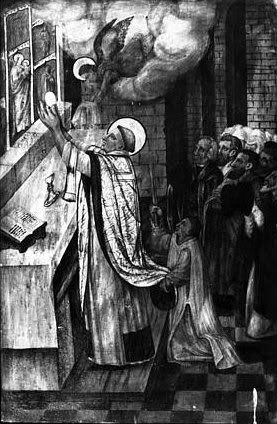
 After the great and wonderful prayers have been
completed, then the bread is become the Body, and the wine the Blood, of our
Lord Jesus Christ. St. Athanasius Sermon to the Newly Baptized
After the great and wonderful prayers have been
completed, then the bread is become the Body, and the wine the Blood, of our
Lord Jesus Christ. St. Athanasius Sermon to the Newly Baptized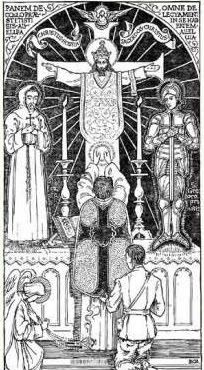
 After
the type had been fulfilled by the Passover celebration and He had eaten the
flesh of the lamb with His Apostles, He takes bread which strengthens the heart
of man, and goes on to the true Sacrament of the Passover, so that just as
Melchisedech, the priest of the Most High God, in prefiguring Him, made bread
and wine an offering, He too makes Himself manifest in the reality of His own
Body and Blood. St. Jerome Commentaries on the Gospel of Matthew
4,26,26
After
the type had been fulfilled by the Passover celebration and He had eaten the
flesh of the lamb with His Apostles, He takes bread which strengthens the heart
of man, and goes on to the true Sacrament of the Passover, so that just as
Melchisedech, the priest of the Most High God, in prefiguring Him, made bread
and wine an offering, He too makes Himself manifest in the reality of His own
Body and Blood. St. Jerome Commentaries on the Gospel of Matthew
4,26,26 For
the whole Church observes this practice which was handed down by the Fathers:
that it prayers for those who have died in the communion of the Body and Blood
of Christ, when they are commemorated in their own place in the sacrifice
itself; and the sacrifice is offered also in memory of them on their behalf. St.
Augustine Sermons 172,2
For
the whole Church observes this practice which was handed down by the Fathers:
that it prayers for those who have died in the communion of the Body and Blood
of Christ, when they are commemorated in their own place in the sacrifice
itself; and the sacrifice is offered also in memory of them on their behalf. St.
Augustine Sermons 172,2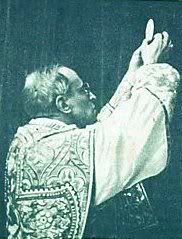


 inundado por um mistério de luz que é Deus e N´Ele vi e ouvi -A ponta da lança como chama que se desprende, toca o eixo da terra, – Ela estremece: montanhas, cidades, vilas e aldeias com os seus moradores são sepultados. - O mar, os rios e as nuvens saem dos seus limites, transbordam, inundam e arrastam consigo num redemoinho, moradias e gente em número que não se pode contar , é a purificação do mundo pelo pecado em que se mergulha. - O ódio, a ambição provocam a guerra destruidora! - Depois senti no palpitar acelerado do coração e no meu espírito o eco duma voz suave que dizia: – No tempo, uma só Fé, um só Batismo, uma só Igreja, Santa, Católica, Apostólica: - Na eternidade, o Céu!
inundado por um mistério de luz que é Deus e N´Ele vi e ouvi -A ponta da lança como chama que se desprende, toca o eixo da terra, – Ela estremece: montanhas, cidades, vilas e aldeias com os seus moradores são sepultados. - O mar, os rios e as nuvens saem dos seus limites, transbordam, inundam e arrastam consigo num redemoinho, moradias e gente em número que não se pode contar , é a purificação do mundo pelo pecado em que se mergulha. - O ódio, a ambição provocam a guerra destruidora! - Depois senti no palpitar acelerado do coração e no meu espírito o eco duma voz suave que dizia: – No tempo, uma só Fé, um só Batismo, uma só Igreja, Santa, Católica, Apostólica: - Na eternidade, o Céu!